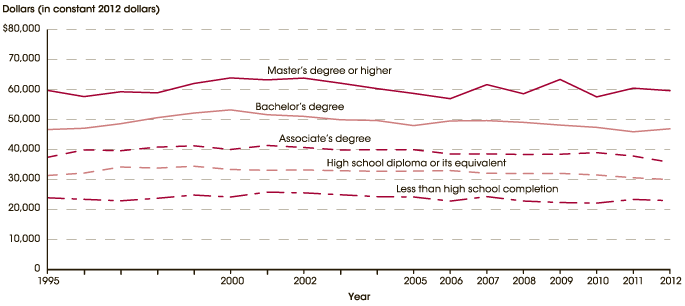This week I will play devil's advocate to try to answer the question of whether education is important to pursue. Surely, life does not always make it easy to go to school. While there are benefits to receiving an education, they all exist in the long-term. Down the road, many years from now, you will get a better job with a better income. But what about making ends meet right now? What about paying the expenses due at the end of the month? What about putting a roof over your head and food on the table? In this context, education appears to be a luxury that may or may not be worth it in the end.
While this is a compelling argument, so are the numbers and testimonials. Below is a graph that reveals the median annual earnings of full-time year-round wage and salary workers ages 25–34, by educational attainment: 1995–2012.
While this is a compelling argument, so are the numbers and testimonials. Below is a graph that reveals the median annual earnings of full-time year-round wage and salary workers ages 25–34, by educational attainment: 1995–2012.
For young adults, your level of education greatly impacts your income. You’re looking at approximately a $10,000 increase with each higher degree you earn. The difference is so significant that I would argue that education is, in fact, worth it in the long run.
So, theoretically, it seems that you should do what you have to do now to get an education so that you may benefit in the future. Easier said than done, right? You would prefer to hear from real people facing real situations, wouldn't you? Well, Latisha Hopewell is one such person. She is a mother of two in her thirties from New York. While she had originally intended to pursue a higher degree, life interfered, and she didn't graduate from college. But through hard work and funding opportunities, Ms. Hopewell found her way back to schooling. Lori Holcomb-Holland writes of Ms. Hopewell’s journey, “College is different this time around. She says she is a better student now that the consequences, as well as the rewards, are more tangible. She wants to give her daughters a better life.”
While it may be difficult to picture how education will improve your life in the future and so easy to feel the ways it is currently burdening you, I recommend that you try to identify and define your tangible consequences and rewards. Use the images of these realities as your motivation. Commit to giving yourself a better life by investing in your education; the future gains will outweigh the current negatives. It’s worth it. You’re worth it. Those who count on you are worth it. Start your future today.
-Samantha Phillips
Please comment and share your motivations, visualizations, or tips that keep you on track!
Sources:
New York Times: Going Back to College, and Teaching Her Daughters the Value of Education
National Center for Education Statistics: Fast Facts- Income of young adults
So, theoretically, it seems that you should do what you have to do now to get an education so that you may benefit in the future. Easier said than done, right? You would prefer to hear from real people facing real situations, wouldn't you? Well, Latisha Hopewell is one such person. She is a mother of two in her thirties from New York. While she had originally intended to pursue a higher degree, life interfered, and she didn't graduate from college. But through hard work and funding opportunities, Ms. Hopewell found her way back to schooling. Lori Holcomb-Holland writes of Ms. Hopewell’s journey, “College is different this time around. She says she is a better student now that the consequences, as well as the rewards, are more tangible. She wants to give her daughters a better life.”
While it may be difficult to picture how education will improve your life in the future and so easy to feel the ways it is currently burdening you, I recommend that you try to identify and define your tangible consequences and rewards. Use the images of these realities as your motivation. Commit to giving yourself a better life by investing in your education; the future gains will outweigh the current negatives. It’s worth it. You’re worth it. Those who count on you are worth it. Start your future today.
-Samantha Phillips
Please comment and share your motivations, visualizations, or tips that keep you on track!
Sources:
New York Times: Going Back to College, and Teaching Her Daughters the Value of Education
National Center for Education Statistics: Fast Facts- Income of young adults


 RSS Feed
RSS Feed